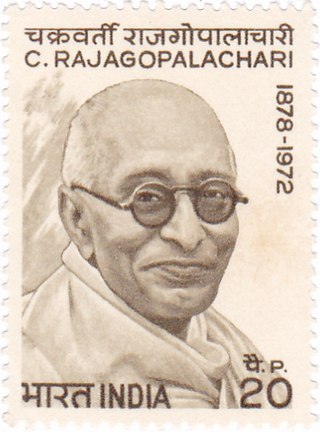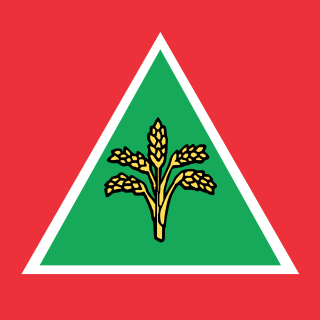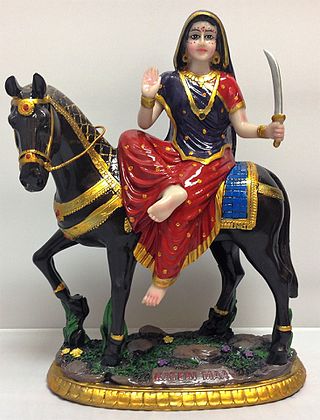Related Research Articles

The Indian National Congress (INC), colloquially the Congress Party or simply the Congress, is a political party in India with widespread roots. Founded in 1885, it was the first modern nationalist movement to emerge in the British Empire in Asia and Africa. From the late 19th century, and especially after 1920, under the leadership of Mahatma Gandhi, the Congress became the principal leader of the Indian independence movement. The Congress led India to independence from the United Kingdom, and significantly influenced other anti-colonial nationalist movements in the British Empire.

Chakravarti Rajagopalachari BR, popularly known as Rajaji or C.R., also known as Mootharignar Rajaji, was an Indian statesman, writer, lawyer, and independence activist. Rajagopalachari was the last Governor-General of India, as when India became a republic in 1950 the office was abolished. He was also the only Indian-born Governor-General, as all previous holders of the post were British nationals. He also served as leader of the Indian National Congress, Premier of the Madras Presidency, Governor of West Bengal, Minister for Home Affairs of the Indian Union and Chief Minister of Madras state. Rajagopalachari founded the Swatantra Party and was one of the first recipients of India's highest civilian award, the Bharat Ratna. He vehemently opposed the use of nuclear weapons and was a proponent of world peace and disarmament. During his lifetime, he also acquired the nickname 'Mango of Salem'.

The Bharatiya Jana Sangh (abbreviated asBJS or JS, short name: Jan Sangh, was an Indian right wing nationalist political party that existed from 1951 to 1977 and was the political arm of Rashtriya Swayamsevak Sangh, a Hindu nationalist volunteer organisation. In 1977, it merged with several other left, centre and right parties opposed to the Indian National Congress and formed the Janata Party.

The Dravida Munnetra Kazhagam is a political party based in the state of Tamil Nadu where it is currently the ruling party having a comfortable majority without coalition support and the union territory of Puducherry where it is currently the main opposition.

The Janata Party was a political party that was founded as an amalgam of Indian political parties opposed to the Emergency that was imposed between 1975 and 1977 by Prime Minister Indira Gandhi of the Indian National Congress. In the 1977 general election, the party defeated the Congress and Janata leader Morarji Desai became the first non-Congress prime minister in independent modern India's history.

The Parti Gerakan Rakyat Malaysia is a liberal political party in Malaysia. Formed in 1968, Gerakan gained prominence in the 1969 general election when it defeated the ruling Alliance Party in Penang and won the majority of seats in Penang's state legislature. In 1972, Gerakan joined the Alliance Party, which later became Barisan Nasional coalition Party (BN), the ruling coalition of Malaysia until 2018. The party left the BN in 2018 and is currently part of the Perikatan Nasional coalition Party (PN).
The Nikhil Utkal Adivasi Congress was a tribal political movemenent in the Indian state of Orissa. It was launched on the initiative leaders of the Indian National Congress in Orissa, who wanted to counter-mobilize against the territorial claims of the Jharkhand Party on the Orissa tribal belt. The organization was founded by Lal Ranjit Singh Bariha in late 1950. Bariha, Tribal Welfare Minister in the pre-1952 Orissa state government, was accompanied by other ministers in building the organization in the Orissa tribal belt. The Abibasi Mahasabha led by Sonaram Soren merged into the Nikhil Utkal Adivasi Congress. In 1951 the Nikhil Utkal Adivasi Congress was able to counter the Jharkhand movement in Orissa, leading to the marginalization of the latter in Orissa politics. In September 1951 Sonaram Soren was named Acting President of Nikhil Utkal Adivasi Congress.

The United Progressive Alliance was a political alliance in India led by the Indian National Congress. It was formed after the 2004 general election with support from left-leaning political parties when no single party got the majority.

The Praja Socialist Party, abbreviated as PSP, was an Indian political party. It was founded when the Socialist Party, led by Jayaprakash Narayan, Rambriksh Benipuri, Acharya Narendra Deva and Basawon Singh (Sinha), merged with the Kisan Mazdoor Praja Party led by J. B. Kripalani.

Seshadri Srinivasa Iyengar CIE, also seen as Sreenivasa Iyengar and Srinivasa Ayyangar, was an Indian lawyer, freedom-fighter and politician from the Indian National Congress. Iyengar was the Advocate-General of Madras Presidency from 1916 to 1920. He also served as a member of the bar council from 1912 to 1920, the law member of Madras Presidency from 1916 to 1920 and as the president of the madras province Swarajya Party faction of the Indian National Congress from 1923 to 1930. Srinivasa Iyengar was the son-in-law of renowned lawyer and first Indian Advocate-general of Madras, Sir Vembaukum Bhashyam Aiyangar. Iyengar's followers called him Lion of the South.

Paramasiva Subbarayan was an Indian politician, freedom fighter and diplomat and was the Chief Minister of Madras Presidency, India's ambassador to Indonesia and Union Minister of Transport and Communications in Jawaharlal Nehru's government. He was the father of General P. P. Kumaramangalam who served as India's Chief of Army staff and politician Mohan Kumaramangalam. He was also the grandfather of INC and BJP politician and Union Minister Rangarajan Kumaramangalam.

General elections were held in Pakistan on 7 December 1970 to elect members of the National Assembly. They were the first general elections since the independence of Pakistan and ultimately the only ones held prior to the independence of Bangladesh. Voting took place in 300 general constituencies, of which 162 were in East Pakistan and 138 in West Pakistan. A further thirteen seats were reserved for women, who were to be elected by members of the National Assembly.

General elections were held in India between 25 October 1951 and 21 February 1952. India attained independence on 15 August 1947 and set up an Election Commission two years later. In March 1950, Sukumar Sen was appointed as the first Chief Election Commissioner. A month later, the Indian Parliament passed the Representation of the People Act which provided the conduct for election for the Houses of Parliament and the Houses of Legislature for each state. It was conducted under the provisions of the Indian Constitution, which was adopted on 26 November 1949. Elections to most of the state legislatures took place simultaneously.

The Alliance Party was a political coalition in Malaysia. The Alliance Party, whose membership comprised United Malays National Organisation (UMNO), Malaysian Chinese Association (MCA) and Malaysian Indian Congress (MIC), was formally registered as a political organisation on 30 October 1957. It was the ruling coalition of Malaya from 1957 to 1963, and Malaysia from 1963 to 1973. The coalition became the Barisan Nasional in 1973.

The fifth legislative assembly election of Tamil Nadu was held in March 1971. Dravida Munnetra Kazhagam was re-elected, after its first victory under the leadership of C N Annadurai in 1967. This was the first time M. Karunanidhi, contested as the leader of DMK party won the election, since he assumed Chief Ministership for the first time, after the death of C N Annadurai. Karunanidhi had emerged successfully in the leadership crisis with other party leaders M. G. Ramachandran, and Nedunchezhiyan, which ensued after the death of C. N. Annadurai. The main opposition party in the election was Indian National Congress (Organisation) led by K. Kamaraj, whereas the Indian National Congress (Indira) faction aligned with Dravida Munnetra Kazhagam.
S. S. Ramasami Padayatchiyar was a politician from the Indian state of Tamil Nadu. He was the founder of the Tamil political party Tamil Nadu Toilers' Party, which is considered to be a predecessor of Pattali Makkal Katchi.
Tamil Nadu Toilers Party was created by members of the populous Vanniyar community of Tamil Nadu, India, during the 1950s. In 1951, Vanniyars convened a conference of the Vanniyar Kula Kshatriya Sanga which intended to organise Vanniyars on a statewide basis. It failed due to traditional local loyalties. S. S. Ramasami Padayachi, chairman of the Cuddalore Municipal school and member of the South Arcot district board, led the Vanniyars of South Arcot and Salem in forming the Tamil Nadu Toilers Party (TTP) while M. A. Manickavelu Naicker, a lawyer, led those from North Arcot and Chengalpattu in the creation of the Commonweal Party.

The first legislative assembly Election to the Madras state based on universal adult suffrage was held in March 1952. This was the first election held in Madras state after the Indian Independence. This election was officially known as the 1951 Madras State Election, even though through delays, actual voting didn't take place until early 1952.
The Kerala Legislative Assembly election of 1957 was the first assembly election in the Indian state of Kerala. The Communist Party of India won the election with 60 seats. The election led to the formation of first democratically elected communist government in India.

Katteri Amman, also abbreviated to Kateri, is a Hindu goddess. Her worship originates in the Dravidian folk religion, that is classified under Hinduism.
References
- ↑ John L. Varianno; Jean-Luc Racine; Viramma Josianne Racine (1997). Viramma: life of an untouchable . Verso. p. 293. ISBN 978-1-85984-817-3.
- ↑ G. G. Mirachandani (2003). 320 Million Judges. Abhinav Publications. p. 30. ISBN 978-81-7017-061-7.